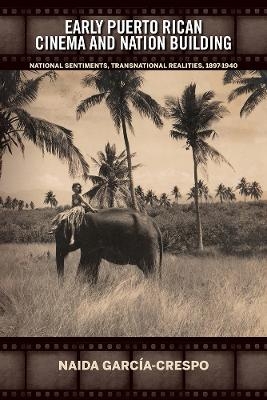
Early Puerto Rican Cinema and Nation Building
Bucknell University Press,U.S. (Verlag)
978-1-68448-118-7 (ISBN)
Early Puerto Rican Cinema and Nation Building focuses on the processes of Puerto Rican national identity formation as seen through the historical development of cinema on the island between 1897 and 1940. Anchoring her work in archival sources in film technology, economy, and education, Naida García-Crespo argues that Puerto Rico’s position as a stateless nation allows for a fresh understanding of national cinema based on perceptions of productive cultural contributions rather than on citizenship or state structures. This book aims to contribute to recently expanding discussions of cultural networks by analyzing how Puerto Rican cinema navigates the problems arising from the connection and/or disjunction between nation and state. The author argues that Puerto Rico’s position as a stateless nation puts pressure on traditional conceptions of national cinema, which tend to rely on assumptions of state support or a bounded nation-state. She also contends that the cultural and business practices associated with early cinema reveal that transnationalism is an integral part of national identities and their development. García-Crespo shows throughout this book that the development and circulation of cinema in Puerto Rico illustrate how the “national” is built from transnational connections.
Published by Bucknell University Press. Distributed worldwide by Rutgers University Press.
NAIDA GARCÍA-CRESPO is an assistant professor of English at the U.S. Naval Academy in Annapolis, Maryland.
INTRODUCTION
Established Frames and Images of Puerto Rican Cinema
Conceptions of the Puerto Rican Nation…
An Alternative Approach to the Study of Puerto Rican National Cinema
This Study’s Framework
CHAPTER ONE- Contexts for a National Cinema: Cultural, Political, and Economic Movements in Puerto Rico 1860-1952
Late Spanish Colonialism through 1898
Circumstances and Consequences of the U.S. Invasion
Initial U.S. Congressional Rule and the Formation of Puerto Rican Identity
Puerto Rican Conceptions of the Nation from 1930 Onward
CHAPTER TWO- Cinema Comes to Puerto Rico: Historical Uncertainties and Ambiguous Identities (1897-1909)
Film Exhibition in Turn-of-the-Century Puerto Rico
Rumors of War Footage
Representing U.S. Colonial Puerto Rico
CHAPTER THREE- Stateless Nationhood, Transnationalism and the Difficulties of Assigning Nationality: Rafael Colorado in Puerto Rican Historiography (1912-1916)
Rafael Colorado, Film Exhibition, and the Transnational Circulation of Cultural Subjects
Rafael Colorado as Cinematic Producer: Negotiating the Local and the Global
Citizenship in a Stateless Nation: Constructing the Puerto Rican Subject
CHAPTER FOUR- In the Company of the Elites: The Discourses and Practices of the Tropical Film Company (1916-1917)
Inconsistencies in the Received Histories of the Tropical Film Company
The Educational/Cultural Project of the Tropical Film Company
The Tropical Film Company’s Commercial Aims
The End of the Beginning: The Tropical Film Company’s Demise and Legacy
CHAPTER FIVE- Perilous Paradise: American Assignment and Appropriation of “Puerto Ricanness” (1917-1925)
From Big Stick to Good Neighbor: Puerto Rico as Test Site for American Foreign Policy
Fictional Puerto Rico and Colonial Angst
Puerto Rico’s Commercial Production Model
U.S. Cinema Falls in Love with the Tropics
The MacManus/Pathé Productions
Famous Player-Lasky/Paramount Comes to the Island
Beyond Fiction: Other Aspects of the Puerto Rican Film Industry in the 1920s
CHAPTER SIX- Making the Nation Profitable: Industry-Centered Transnational Approaches to Filmmaking (1923-1940)
The Film Enthusiast: The Career of Juan E. Viguié Cajas
Romance tropical: Re-making the Dream
The Film Impresario: The Career of Rafael Ramos Cobián
Mis dos amores: The Union of Hollywood and Latin America
Los hijos mandan: The Separation of Hollywood and Latin America
The End of an Era: The Local Government as Producer
CONCLUSION- Early Puerto Rican Cinema and Stateless Nation Building
Finding the National in the Transnational
ACKNOWLEDGEMENTS
BIBLIOGRAPHY
INDEX
| Erscheinungsdatum | 19.07.2019 |
|---|---|
| Sprache | englisch |
| Maße | 152 x 229 mm |
| Gewicht | 458 g |
| Themenwelt | Kunst / Musik / Theater ► Film / TV |
| Geisteswissenschaften ► Geschichte ► Regional- / Ländergeschichte | |
| Geisteswissenschaften ► Sprach- / Literaturwissenschaft ► Anglistik / Amerikanistik | |
| Geisteswissenschaften ► Sprach- / Literaturwissenschaft ► Literaturwissenschaft | |
| Sozialwissenschaften ► Kommunikation / Medien ► Medienwissenschaft | |
| ISBN-10 | 1-68448-118-X / 168448118X |
| ISBN-13 | 978-1-68448-118-7 / 9781684481187 |
| Zustand | Neuware |
| Haben Sie eine Frage zum Produkt? |
aus dem Bereich


